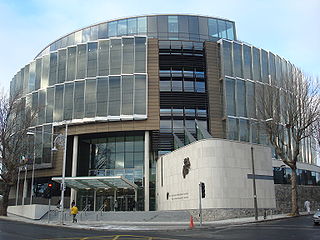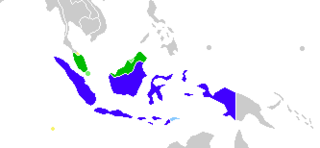An assault is the act of inflicting physical harm or unwanted physical contact upon a person or, in some specific legal definitions, a threat or attempt to commit such an action. It is both a crime and a tort and, therefore, may result in either criminal and/or civil liability. Generally, the common law definition is the same in criminal and tort law.
In many common law jurisdictions, an indictable offence is an offence which can only be tried on an indictment after a preliminary hearing to determine whether there is a prima facie case to answer or by a grand jury. In the United States, a crime of similar severity and rules is called a felony, which also requires an indictment.
A summary offence is a crime in some common law jurisdictions that can be proceeded against summarily, without the right to a jury trial and/or indictment.
The Courts of England and Wales, supported administratively by Her Majesty's Courts and Tribunals Service, are the civil and criminal courts responsible for the administration of justice in England and Wales.

The Criminal Code is a law that codifies most criminal offences and procedures in Canada. Its official long title is "An Act respecting the criminal law". Section 91(27) of the Constitution Act, 1867 establishes the sole jurisdiction of Parliament over criminal law in Canada.
A hybrid offence, dual offence, Crown option offence, dual procedure offence, offence triable either way or wobbler is one of the special class offences in the common law jurisdictions where the case may be prosecuted either summarily or as indictment. In the United States, an alternative misdemeanor/felony offense lists both county jail and state prison as possible punishment. Similarly, a wobblette is a crime that can be charged either as a misdemeanor or an infraction.

The Special Criminal Court (SCC) is a juryless criminal court in Ireland which tries terrorism and serious organised crime cases.

The Offences against the Person Act 1861 is an Act of the Parliament of the United Kingdom of Great Britain and Ireland. It consolidated provisions related to offences against the person from a number of earlier statutes into a single Act. For the most part these provisions were, according to the draftsman of the Act, incorporated with little or no variation in their phraseology. It is one of a group of Acts sometimes referred to as the criminal law consolidation Acts 1861. It was passed with the object of simplifying the law. It is essentially a revised version of an earlier consolidation Act, the Offences against the Person Act 1828, incorporating subsequent statutes.
A discharge is a type of sentence where no punishment is imposed, and which vitiates the court's guilty verdict, thus resulting in a non-conviction.
The criminal law of Canada is under the exclusive legislative jurisdiction of the Parliament of Canada. The power to enact criminal law is derived from section 91(27) of the Constitution Act, 1867. Most criminal laws have been codified in the Criminal Code, as well as the Controlled Drugs and Substances Act, Youth Criminal Justice Act and several other peripheral statutes.

The Wildlife Protection Act, 1972 is an Act of the Parliament of India enacted for protection of plants and animal species. Before 1972, India only had five designated national parks. Among other reforms, the Act established schedules of protected plant and animal species; hunting or harvesting these species was largely outlawed. The Act provides for the protection of wild animals, birds and plants; and for matters connected therewith or ancillary or incidental thereto. It extends to the whole of India, except the State of Jammu and Kashmir which has its own wildlife act. It has six schedules which give varying degrees of protection. Schedule I and part II of Schedule II provide absolute protection - offences under these are prescribed the highest penalties. Species listed in Schedule III and Schedule IV are also protected, but the penalties are much lower. Schedule V includes the animals which may be hunted. The specified endemic plants in Schedule VI are prohibited from cultivation and planting. The hunting to the Enforcement authorities have the power to compound offences under this Schedule. Up to April 2010 there have been 16 convictions under this act relating to the death of tigers.
Capital punishment is a legal penalty in Malaysia that is currently suspended from being carried out. It is a mandatory punishment for murder, drug trafficking, treason, and waging war against Yang di-Pertuan Agong. Recently, the law was extended to include acts of terrorism. Any terrorists, and anyone who aids terrorists, financially or otherwise, is liable to face the death penalty. Since January 2003, the death penalty in Malaysia has been a mandatory punishment for rapists that cause death and child rapists. A 1961 law states that kidnapping carried a life sentence or a death sentence, preceded by a whipping.

The Official Secrets Act 1972, is a statute in Malaysia prohibiting the dissemination of information classified as an official secret. The legislation is based on the Official Secrets Act of the United Kingdom. After criticism of the act for lacking clarity, it was amended in 1986.

The Criminal Law Act 1977 (c.45) is an Act of the Parliament of the United Kingdom. Most of it only applies to England and Wales. It creates the offence of conspiracy in English law. It also created offences concerned with criminal trespass in premises, made changes to sentencing, and created an offence of falsely reporting the existence of a bomb.

The Magistrates Court of the Australian Capital Territory is a court of summary jurisdiction that deals with the majority of criminal law matters and the majority of small civil law matters in the Australian Capital Territory, the Jervis Bay Territory and the Australian Antarctic Territory.

The Criminal Justice and Immigration Act 2008 is an Act of the Parliament of the United Kingdom which makes significant changes in many areas of the criminal justice system in England and Wales and, to a lesser extent, in Scotland and Northern Ireland. In particular, it changes the law relating to custodial sentences and the early release of prisoners to reduce prison overcrowding, which reached crisis levels in 2008. It also reduces the right of prison officers to take industrial action, and changed the law on the deportation of foreign criminals. It received royal assent on 8 May 2008, but most of its provisions came into force on various later dates. Many sections came into force on 14 July 2008.
Bail in Canada refers to the release of a person charged with a criminal offence prior to being tried in court or sentenced. The Canadian Charter of Rights and Freedoms guarantees the right not to be denied reasonable bail without just cause. That right is implemented by the Criminal Code, which provides several ways for a person to be released prior to a court appearance. A person may be released by a peace officer or by the courts. A release by the courts is officially known as a judicial interim release. There are also a number of ways to compel a person's appearance in court without the need for an arrest and release.

The Code of Criminal Procedure is the main legislation on procedure for administration of substantive criminal law in India. It was enacted in 1973 and came into force on 1 April 1974. It provides the machinery for the investigation of crime, apprehension of suspected criminals, collection of evidence, determination of guilt or innocence of the accused person and the determination of punishment of the guilty. Additionally, it also deals with public nuisance, prevention of offences and maintenance of wife, child and parents.
Scheduled offence may refer to:

The Criminal Justice Act 1988 is an Act of the Parliament of the United Kingdom.









